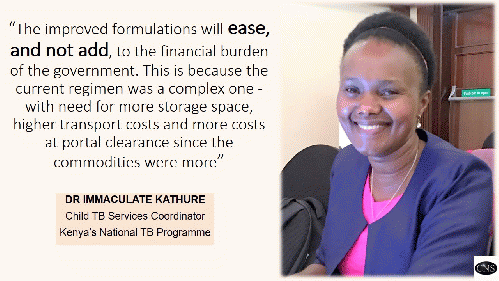
Dr Immaculate Kathure, Child TB Services Coordinator, Kenya National TB Programme
(Image by CNS (Citizen News Service)) Details DMCA
Yes, this question merits serious thought, even as Kenya Ministry of Health recently announced the launch of fixed dose combination (FDC) of first-ever child-friendly TB medicines, making Kenya the first country in the world to roll out these products nationally. Starting 1st of October 2016, all children in Kenya, who will be initiated on TB treatment, will be given the improved formulation that is easier for caregivers to give and for children to take, and is expected to help improve treatment outcomes of childhood TB.
It was on 2nd December, 2015, just ahead of 46th Union World Conference on Lung Health in Cape Town, South Africa, that the world's first appropriate, child-friendly FDC medicines to treat children suffering from drug-sensitive TB were launched, thanks to the untiring efforts of TB Alliance and its partners: WHO, UNITAID and USAID.
During the launch almost 10 months back, Dr Enos Masini, Kenya's National Tuberculosis Programme manager, had said, "Childhood TB is a problem that can be solved when we choose to act. We need to make sure all children with TB are diagnosed and treated with the best medicines possible. I am proud to say Kenya plans to adopt these new products for our children immediately, which will greatly improve our response to treating drug-sensitive TB."
Well, exactly 10 months down the line, Kenya has honoured its promise. What about the rest of the world? How long will other countries take to introduce the new improved paediatric TB medicines?
Citizen News Service (CNS) interviewed (via email) Dr Immaculate Kathure, Child TB Services Coordinator of the Kenya National TB Programme. Here are excerpts from Dr Kathure's interview:
What prompted Kenya to lead introduction of new formulation?
Dr Immaculate Kathure: "The Kenya government's national TB programme has a commitment to ensure that we reduce the burden of lung disease in Kenya, rendering Kenya free of TB. This is through the provision of people-centric, universally accessible, acceptable and affordable quality services. Childhood TB is one of the key services we focus on, considering the vulnerability of children to TB. The government is also committed to reducing mortality among children and successful treatment of TB is one of the strategies to ensure we realize this goal.
Children with TB and their caregivers have over the years struggled with TB treatment that is complex - they had to split and crush multiple pills to achieve the right dose for children and children had to swallow these water insoluble bitter-tasting pills. Moreover it was difficult to determine whether children were receiving the correct dose of medicines or not. All this made TB treatment ineffective and increased the rates of drug resistant TB in children. We went for the improved medicines to avert this."
(Note: You can view every article as one long page if you sign up as an Advocate Member, or higher).





